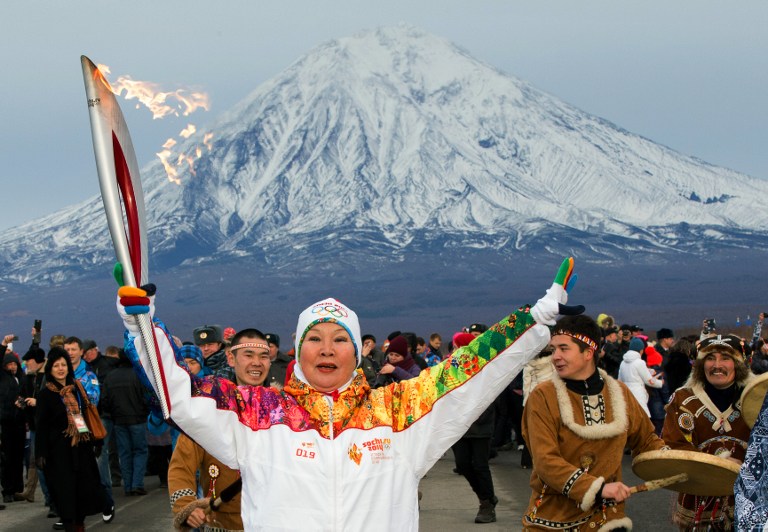
A handout picture taken during the Sochi 2014 Winter Olympic torch relay on November 12, 2013, and released by the Sochi 2014 Winter Olympics Organizing Committee shows a torchbearer rising her torch at Russia’s Pacific Kamchatka peninsula, some 6766 kilometers (4204 miles) east of Moscow. Russian torchbearers has started in October the history’s longest Olympic torch relay ahead of Winter Games in Sochi, which will take the flame across the country through all 83 of its regions, including extreme locales such as Chukotka, the turbulent North Caucasus, and even Russia’s European exclave Kaliningrad. AFP
JOHANNESBURG, South Africa- Tests for banned substances will be more stringent than ever for the 2014 Winter Olympics, the new International Olympic Committee (IOC) president said Wednesday.
Athletes will undergo 1,269 pre-competition tests- over 400 more than the Vancouver games- while total tests will increase by almost 300 to 2,453, said the IOC’s Thomas Bach.
“We shall be smarter and tougher in our fight against doping than at any previous Olympic Winter Games,” he told delegates at the World Conference on Doping in Sport in Johannesburg.
Bach, who replaced Jacques Rogge as Olympic chief in September, supported more stringent bans for athletes caught doping.
“What we need is the greatest possible deterrents.”
“I strongly argued for a lifetime ban, even for a first doping offence,” he said, adding that he eventually realized such bans were unworkable.
He “strongly urged” delegates to back the revised anti-doping code’s more stringent punishments.
Global sports leaders will this week ratify the new code that doubles bans for intentional doping culprits from two to four years.
This automatically excludes them from the next Olympics.
The measure is seen to prevent another case at the Court of Arbitration for Sport, which struck down a similar IOC ban in 2011.
In 2008 the Olympics body barred athletes who had been suspended for six months or longer from taking part in the next Olympics, even if they had already served their suspension.
But the court found the measure violated the current anti-doping code, which allowed 2008 Olympics 200-meter champion LeShawn Merritt to compete in London last year.
He had been banned for 21 months after using a sex enhancer, but would have been excluded from the London games under the rule.
He ended up limping out of his heat.
“Millions” of dollars would be spent on increasing laboratories and services for the Sochi games, said Bach, terming the costs “an investment to the future of our sport.”
“The fight against doping is like security measures. It is also about deterrents and protection,” said the IOC president, hinting at parallels with the fight against terrorism.
“Our security measures, and so our tests, must be improved still more,” he said, highlighting the need for increased research into doping.
“Protecting the clean athletes must be our ultimate goal. It must have top priority in all our decisions and initiatives.”

